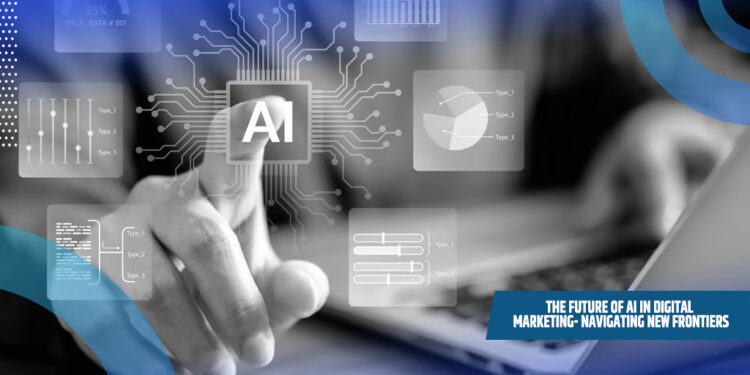Artificial intelligence (AI) is no more a future idea; rather, it is already a main engine of creativity in digital marketing. Companies all over are using artificial intelligence to simplify processes, boost marketing plans, and enhance consumer experiences. The function of artificial intelligence in digital marketing is growing as technology develops, therefore posing new possibilities and problems for marketers.
1. Mass Personalisation at Scale
Enabling marketers to provide customers with tailored information on scale, artificial intelligence has transformed personalisation. To provide tailored suggestions, machine learning systems examine enormous volumes of data—including preferences, purchasing history, and browsing behavior—including For example, platforms like Netflix and Amazon employ artificial intelligence to propose goods and films depending on user behaviour, therefore increasing interaction and conversion.
Personalisation powered by artificial intelligence will get even more complex going forward. Predictive analytics will provide companies proactive solutions and help them to see consumer requirements before they develop. Stronger client connections and brand loyalty may result from this degree of customising.
2. Improved client perceptions
By means of sophisticated data analysis, artificial intelligence helps companies to get closer understanding of consumer behaviour. Sentiment analysis and natural language processing (NLP) among other tools enable businesses to better grasp consumer thoughts and emotions conveyed in reviews, social media, and customer feedback forms.
These revelations help companies to customise their marketing to really appeal to their target market. AI will be especially important going ahead in offering real-time information so companies may rapidly modify their plans to satisfy evolving client expectations.
3. Conversational intelligence and chatbots
AI-powered chatbots are revolutionising consumer involvement and service. AI-driven bots may respond human-like, grasp context, learn from encounters unlike conventional chatbots. They guarantee fast response, manage many enquiries at once, and provide 24/7 service, hence raising client satisfaction.
Chatbots will becoming more user-friendly and competent of managing challenging questions as artificial intelligence develops. Lead generation will also benefit more from conversational artificial intelligence solutions, which will effortlessly guide potential consumers over the sales process.
4. Automated Generation of Content
Content production is accelerating and more effectively produced by artificial intelligence. In seconds, tools like GPT models—akin to ChatGPT—can create blog entries, product descriptions, and ad text. These instruments guarantees consistency in brand message and save time for marketers.
Though artificial intelligence may help create content, it’s important to balance automation with human ingenuity. AI will probably be a collaborative tool in content marketing going forward, allowing authors to concentrate on strategy and narrative while managing repetitious chores.
5. Improved Advertising Strategies
Digital advertising’s potency has been much enhanced by artificial intelligence. Using artificial intelligence, sites like Google adverts and Facebook Ads maximise campaigns to guarantee that adverts reach the correct audience at the correct moment. Tools powered by artificial intelligence examine user data, project performance, and automatically change proposals for improved outcomes.
AI will drive even more exacting advertising in the next years. Predictive analytics, for instance, may spot new trends that let companies build commercials that appeal to present customer tastes. Dynamic creative optimisation (DCO) will let adverts change in real time depending on user interactions.
6. Optimise Voice Search
Voice search is changing digital marketing plans as voice assistants like Alexa, Siri, and Google Assistant get more well-liked. These voice-activated exchanges are made possible in great part by artificial intelligence.
Marketers will have to maximise their material for voice search and concentrating on conversational keywords and straight direct responding of enquiries. Local SEO will also be impacted by speech artificial intelligence as customers often utilise voice searches to locate surrounding companies.
7. Data Privacy Ethical AI
Ethical issues will take the stage as artificial intelligence is more included into digital marketing. How personal data is gathered and used worries consumers more and more. Marketers have to guarantee openness and follow GDPR and CCPA as rules on data protection.
The future will call for ethical use of artificial intelligence, with an eye on client confidence development. Ethical AI methods include safe data management and objective algorithms will start to be a competitive advantage for companies.
8. Predictive Analytics Drived by AI
Among artificial intelligence’s most fascinating uses in digital marketing is predictive analytics. Analysis of past data allows artificial intelligence to forecast consumer behaviour, campaign results, and future trends.
From introducing new products to refining marketing budgets, marketers can use these insights to make data-driven choices. As predictive analytics develops, companies will be able to keep ahead of the competition and properly fulfil consumer needs.
9. Visual and Video AI
AI is changing content marketing including visuals and videos. AI-powered tools can create, edit, and automatically optimise images and films for many platforms. AI may, for example, examine video performance data and recommend enhancements to raise interaction levels.
Creating interactive and immersive marketing experiences will also depend much on deep learning technologies like picture recognition and augmented reality (AR). These instruments allow companies to enthral viewers and set themselves apart in saturated marketplaces.
10. The Ascendancy of Hyper-Automation
Combining artificial intelligence, machine learning, and other cutting-edge technology, hyper-automation automates intricate marketing tasks. From email marketing to lead scoring, hyper-automation simplifies processes and increases effectiveness.
Hyper-automation will allow marketers to concentrate more on strategic decisions going forward while artificial intelligence handles daily chores. For marketing initiatives, this strategy may increase return on investment and provide quicker outcomes.
Last Thought
Artificial intelligence is changing digital marketing and presents hitherto unheard-of chances to interact with consumers, maximise campaigns, and drive expansion. Companies have to change as the technology develops and using artificial intelligence tools and techniques while still stressing ethical behaviour and human ingenuity.
Though success will rely on how successfully companies can use these technologies to establish real relationships with their consumers, the future of artificial intelligence in digital marketing offers fascinating advances. Marketers that remain knowledgeable and flexible will be able to confidently negotiate these new frontiers.















 The Inc Media is one of the most renowned global Online Business Magazines, that carries news stories about entrepreneurship, small business management, and business. Being a global business magazine, we carve for influential stories and try to take them globally to uplift the business standards and educate the people about new innovations in the business world...
The Inc Media is one of the most renowned global Online Business Magazines, that carries news stories about entrepreneurship, small business management, and business. Being a global business magazine, we carve for influential stories and try to take them globally to uplift the business standards and educate the people about new innovations in the business world...